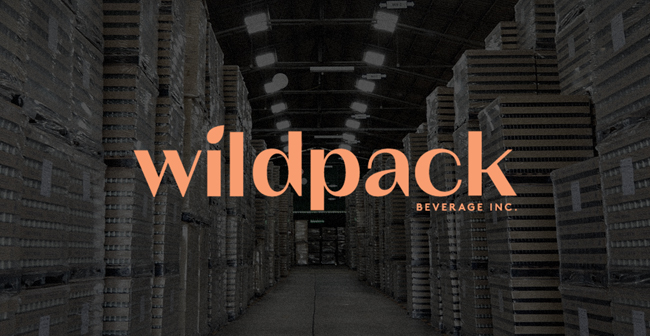Toronto-based canning company Wildpack announced today it has acquired Michigan-based Land and Sea Packaging for $26.1 million, as well as common shares of Wildpack with an aggregate value of about $11.2 million.
The deal, the sixth facility acquisition for Wildpack and its fourth transaction of this year, marks the further expansion of the publicly traded company’s national network of beverage production facilities through its U.S. subsidiary. But according to co-founder and CEO Mitch Barnard, the company is already working on its next acquisition in the coming months as it makes progress towards its goal to own 14 U.S. facilities by the end of 2022.
“They have followed the exact same growth trends that we have,” Barnard told BevNET. “They have been growing high double-digits, year-over-year, for the last couple years and they’re seeing the same things in the market that we’re seeing. So it’s joining forces of very like-minded people with a similar goal, who are both executing very aggressively on their strategies.”
Barnard noted that the two companies “fill each other’s blindspots,” as Land and Sea provides strong printed aluminum can brokering and supply chain logistics, while Wildpack emphasizes manufacturing and manufacturing logistics. Land and Sea currently brokers over 90 million cans per year and services clients in 15 states. The company’s owner Kim Murray and COO Tim Murray will remain with Wildpack, joining its board of directors.
“We’re really [building] each other up and becoming this much larger conglomerate that takes a greater portion of the total market, which will allow us to springboard and increase the types of companies that we can go and acquire,” he said. “Because we have the internal expertise and building blocks behind it to accelerate in those different divisions.”
Founded in 2018, Wildpack’s North American production network specializing in aluminum can filling and sleeving has been built on M&A. Publicly traded on the Toronto Stock Exchange, the company is run by Barnard and his co-founders — CFO Ryan Mason, chief growth officer Thomas Walker and director and former CEO Stephen Fader. The group bring with them a background in corporate M&A and venture capital; Barnard himself is a former lawyer and, along with Mason and Walker, is a partner in Vancouver-based firm Bast Capital.
Barnard said the concept for Wildpack is to create a vast network of canning facilities that can service local brands, providing them with transparent, streamlined packaging solutions that “feels a lot more like ordering a Domino’s Pizza.”
“Ultimately after doing a lot of due diligence, we realized there was a massive supply/demand economic tilted towards the demand side in the manufacturing space,” Barnard said. “And the way that the manufacturing space operates is just massively archaic and non-transparent. So, you couple that with the fact that there was no capacity, we said ‘Look, we think we can use our M&A backgrounds to go and run a consolidation, buy a bunch of independent manufacturing companies in the beverage space, and with that we can create some significant value for the brands.”
The company now owns and operates facilities in Baltimore, Atlanta, Sacramento, Las Vegas and Longmont, Colorado. With Land and Sea, located in Grand Rapids, Michigan, Wildpack now has a footprint in the upper Midwest and future acquisitions will continue to be targeted towards new regions, Barnard said.
Wildpack reported Q2 revenue of $8.1 million, up 26% from Q1, with filling volume up 50%. Since June, new decorating lines have been added to the Baltimore and Las Vegas facilities and a new printer in Las Vegas is expected to be online by the end of the year. Barnard said the company has grown its staff from about 40 employees last year to over 300 and is now projecting triple-digit year-over-year growth.
The M&A strategy is also fueled by being a public company, Barnard said, as it opens up more access to capital and is able to use shares as currency in transactions. As Wildpack works to “consolidate a fragmented middle market,” he added that the transparency of being a public company has also helped making deals with acquisition easier.
The company’s expansion comes as a global supply chain crisis has disrupted the availability of aluminum cans. According to Barnard, Wildpack opted to focus solely on cans due to a “structural shift in consumption patterns,” noting that in 2014 only around 30% of new beverage brands launched their products in cans, while today that number has grown to roughly 80%. As suppliers work to shore up production and meet demand amid the shortage, Wildpack is aiming to be a key player in the space as the changes in consumer behavior are cemented.
“Everyone theorized that coming out of COVID, as taprooms reopened, that people would go back to bars and all that kind of stuff, and you would see ready-to-drink usage start to slow down,” he said. “But we’ve actually seen it accelerate out of COVID, which is super interesting.”
While Land and Sea currently services PET and glass bottled products, Barnard said the company had already been shifting its focus towards cans (now about 90% of the business) and under Wildpack it will continue to fulfill plastic and glass orders for existing customers before slowly sunsetting those operations.
Looking ahead, Wildpack plans to continue its focus on the U.S., but may look towards expansion in Canada by 2023, he said, with Europe also under consideration.
“Wildpack is always going to be searching for opportunities and innovation in the beverage manufacturing space,” he said. “Albeit we have a very articulated strategic business plan with how we grow our core competencies; along the way, there’s going to be a lot of value that we find, see and execute on. You can only really do that when you have a team that’s 100% in the growth mindset.”
